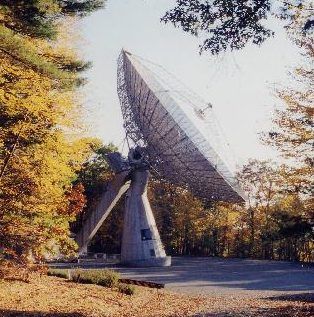“The more anxiety one produces, the more the discussion there would be about how real and how possible actual existential threats are.”
John Hunt recently queried me on what steps I might take to form an organization to advocate for survival colonies and planetary defense. His comment on anxiety is quite succinct. In truth the landing on the moon was the product of fear- of the former Soviet Union’s lead in rocket technology. As we as a nation quelled that anxiety the budget for human space flight dwindled. But the fear of a nuclear winter continued to grow along with the size of our arsenals.
Interestingly, at the height of the cold war, evidence of yet another threat to human existence was uncovered in the Yucatan peninsula of Mexico in 1981; Chicxulub. But even before the dinosaur killer was discovered, perhaps the greatest threat of all to humanity was born in 1973 when Herb Boyer and Stanley Cohen created the first genetically modified organism. The money to answer both of these threats by going into space continues to be expended by the military industrial complex.
Mile wide rocks in space and microscopic organisms on earth are both threats to our existence, but the third and undoubtedly greatest threat is our own apathy. Why do we expend the tremendous resources of our race on everything BUT keeping it from going extinct?
The answer to this important question is our own fear of death. As I have written previously, we are as individuals in the predicament of a circus freak on death row. It is a bizarre yet accurate characterization. None of us expect to live forever, but then we do not expect to die tomorrow either. We are in limbo between certain death and temporary life and cannot face the reality of the first while obsessing over the banalities of the second.
Examples of our determination to stay distracted can be found in the babbling of gravity modifiers, CERN doomsday prophets, and various other fruit flavored contributors to this blog. We desperately want to believe in UFO’s, conspiracies and fantastical solutions so we do not have to face the disquiet we experience whenever we pass a funeral home or graveyard. I am happy to pummel these idiots with the harsh language they deserve- especially when they destroy the credibility of sites like this which are trying to accomplish something worthwhile.
So I am thinking there is so much anxiety being monopolized that there is little market left for me capitalize on. Something different is required; as Bill Gates advised young entrepreneurs recently, “Don’t do what I did.” It has all been done and no clever marketing or deceptive advertising is going to build cities on other worlds. Space tourism is not going to save us- if anything it is a dangerous waste of time and money.
What is required is a popular culture renaissance that can focus the energy of several generations in a single direction. The uniqueness of this crossroads in history can be found in considering the nearly unbelievable difference in the level of scientific knowledge today compared to a half century ago. There is nothing more evident to the mature members of the western world than it’s age- our standard of living has brought about fewer children while the less fortunate parts of the world have accelerated their reproductive rates. Disparities in wealth and standards of living are stark evidence of the circus freak scenario. Very few of us are aware that there is a possible escape from this death sentence we are all born under. A standby of science fiction for decades has been the freezing of human beings for space travel. To delay death indefinitely and be resurrected when a cure for a disease or old age is found is a familiar concept. The parallels with Christianity are unmistakable.
We, as in my fellow human beings who were born around 1960, are seeing the culture we grew up in fade away as no other generation ever has. We lived through decades of threatened nuclear holocaust only to see our hoped for space age future dismantled by consumerism and profiteering. Personally, I find the presence of skulls everywhere to be the most poignant and disturbing portent of things to come. The veterans who fought in World War II and were everywhere when I was a boy would never have allowed this emblem of the Nazi SS to become so popular. It was the symbol of ruthless and murderous force as being the only meaningful feature of reality. 60 million human beings were killed in the fight against the evil it represents. And now it is back.
To counter to the present lack of vision I would like to introduce an agent of change in the form of a idealized past age. What better ideal than the movement that conquered fascism originally? Christianity did in fact conquer the Roman Empire- and as it is said we are all children of Rome, then we are also children of the carpenter from Nazareth. A technological analogy that can be discerned when considering the original Christianity and the modern world is the Gladius and the Atom Bomb. The Romans learned the fine points of using their infamous short swords by watching gladiators fight to the death- a funerary tradition they inherited from the Etruscans they assimilated. The training of professional gladiators was applied to the military and made “Drill a bloodless Battle and Battle a bloody Drill.”
The sword made the Roman Empire and Christianity inherited this prize. The Atom Bomb has kept modern civilization from World War for over a half century- but so far there is no great social movement that will inherit this mighty construct before it falls into a new dark age. The Fermi Paradox points to the possibility that this empire could well be the last; there will be no more cycles of civilizations rising and falling if we become extinct. If so then this really may be the end of the world- with no need to throw away reason in favor of the Book of Revelation.
What is most curious is that while the sword had no utility outside of murder, the Atomic Bomb holds the power to transcend this arena of earth and allow humankind to populate the galaxy. If this civilization can survive to travel to new worlds then the last empire will have risen- the last because it can never fall again.
So, to form a society of believers in life, in the future of the human race, the goals must be clear and easily understood;
If the human race is to survive, the individual must have some hope of surviving. The immediate need is a way to delay death and that procedure is practically a reality with advances in cryopreservation.
If the human race is to survive, new worlds must be found and colonized. The immediate need is for survival colonies off-world and atomic spaceships to establish those colonies and defend the earth from impact threats.
If the individual and the race as a whole is to survive, action must be taken. The immediate need is an organization to take money in and distribute it to the corporations and politicians that can direct the massive governmental resources necessary to accomplish a great rescue with cryopreservation and to construct spaceships to establish off world colonies and deflect impact threats.
Figuratively, metaphorically, the Christians conquered the old empire and the Astronomers who harness the power of the sun will inherit this empire. Since the more catchy titles have been taken by religious cults, I suggest the organization that will initiate action be called,
The Society of Christian Astronomers
My first call is for the money to copyright the title of the society and a brand I have in mind.



